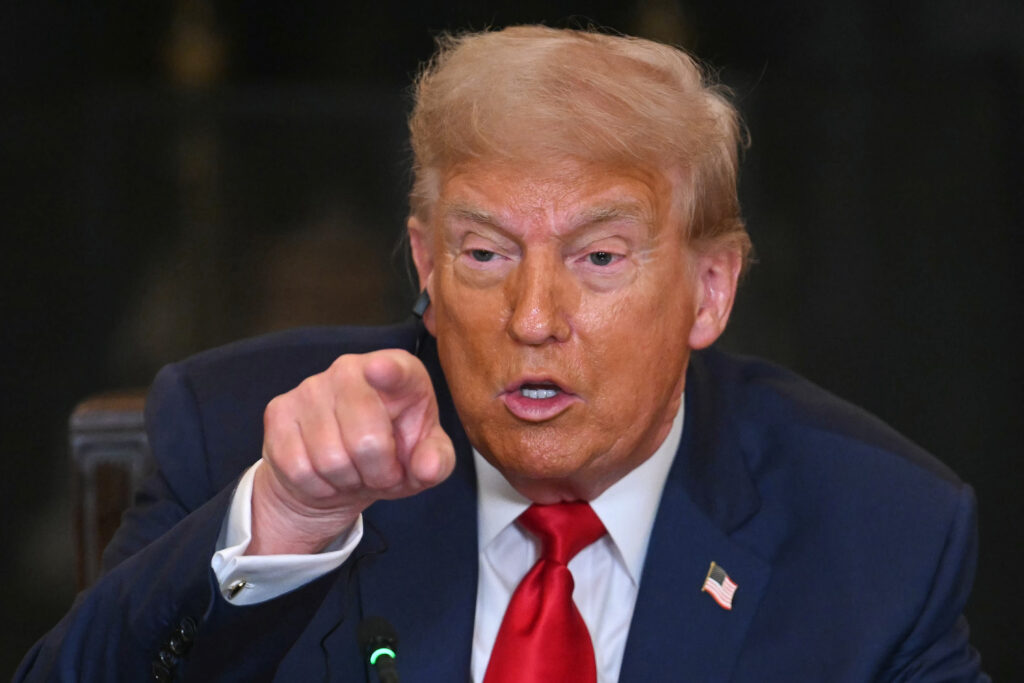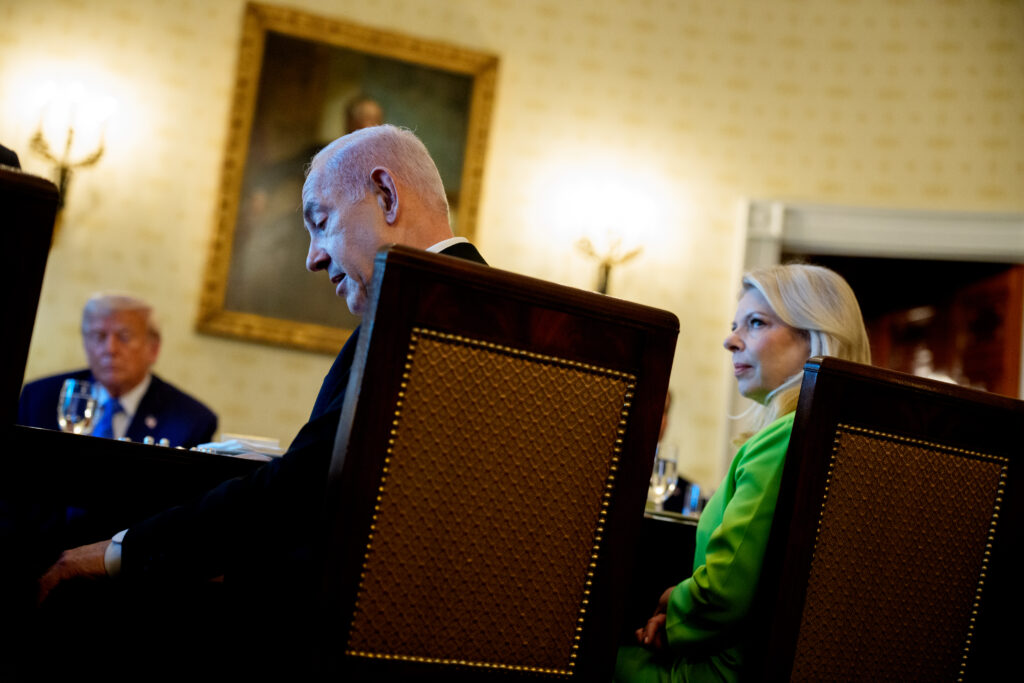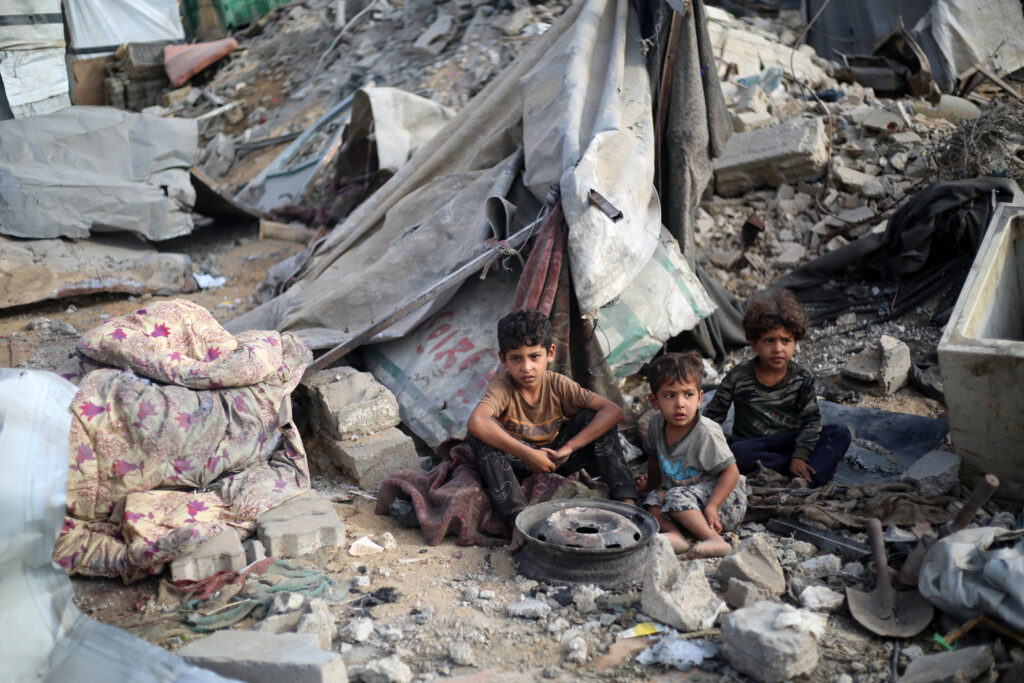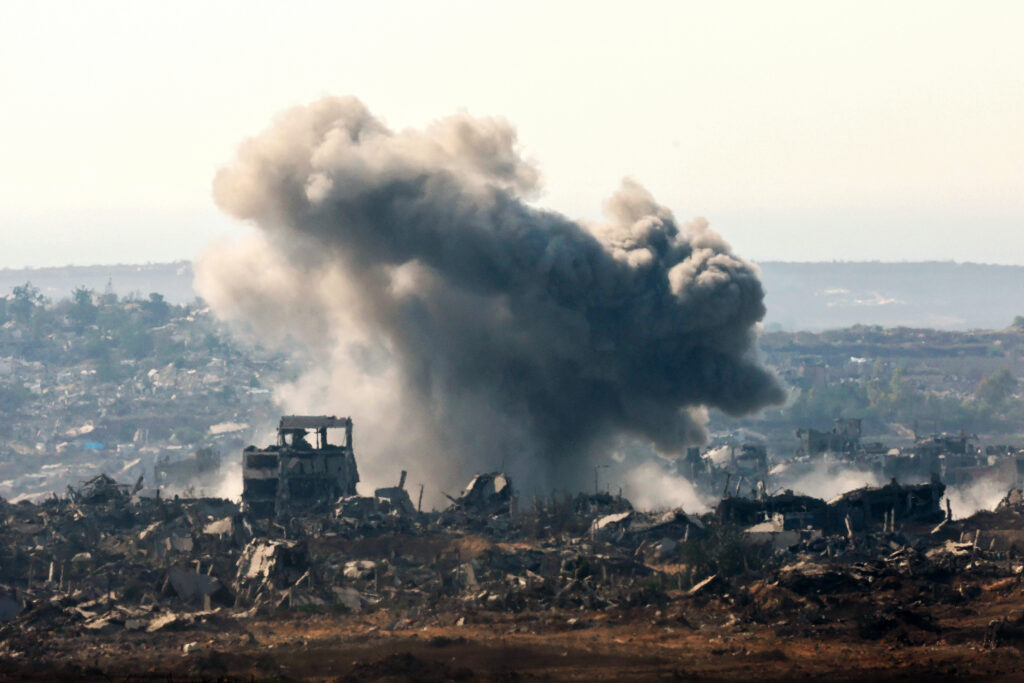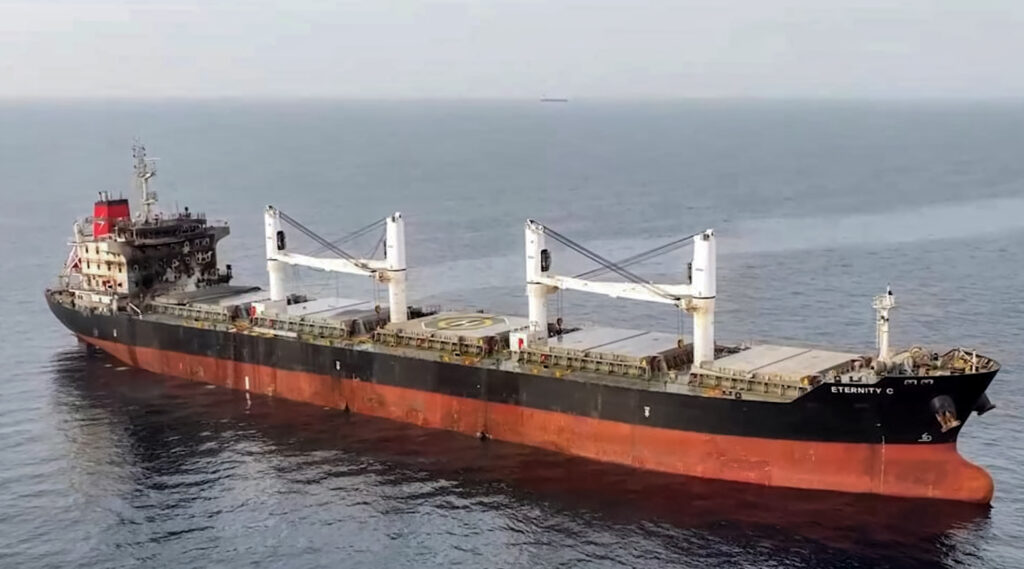AFP Asia Business
US targets attempts to dodge Trump tariffs with China in crosshairs
As President Donald Trump ramps up tariff threats on US trading partners, his administration is taking aim at a tactic said to be used by Chinese companies to dodge the levies by moving goods through third countries.The issue is “transshipping,” or having products pass through a country to avoid harsher trade barriers elsewhere, a practice …
US targets attempts to dodge Trump tariffs with China in crosshairs Read More »
Sara Netanyahu: the ever-present wife of Israel’s prime minister
Whether dining opposite US President Donald Trump or accompanying her husband on an official Pentagon visit, Sara Netanyahu’s front-row role in Washington this week has sparked fresh questions over her place in Israeli politics.Prime Minister Benjamin Netanyahu’s third wife and the mother of two of his children, Sara Netanyahu has long made headlines, notably for her alleged involvement in the political decisions of her husband.”My wife and I…” is a phrase often used by the Israeli premier in his official statements, helping to cement Sara’s position at the forefront of public life.This week, as the prime minister visited Washington for a series of high-level meetings in which he discussed a potential Gaza ceasefire deal with the US president, his wife was noticeably present.On Tuesday, she was photographed sitting opposite Trump at an official dinner following a meeting between the two leaders.Two days later, she appeared next to her husband, as well as US Defense Secretary Pete Hegseth and his wife, Jennifer Rauchet, as they arrived for meetings at the Pentagon.But speculation had swirled even before the Netanyahus’ departure for Washington.On the eve of the trip, the prime minister’s office announced the resignation of his spokesman Omer Dostri.A few hours later, following media reports claiming that his wife had been involved in the decision, another statement was issued denying she had any role.Sara Netanyahu has been the subject of several investigations, including for corruption, fraud and breach of trust, and has also been questioned in connection with her husband’s ongoing graft trial.Married to Benjamin Netanyahu since 1991, the 66-year-old is the target of frequent media attacks which are regularly denounced by her husband.She has been caricatured in satirical programmes for her fashion choices or her profession as a child psychologist, which she has often appeared to boast about.But above all, she has been targeted for her alleged interference in state affairs. – ‘The real prime minister’ -In a video released in December 2024, Netanyahu denied that his wife was involved in his cabinet appointments or that she was privy to state secrets.It followed an investigation into Sara Netanyahu aired by Israel’s Channnel 12 which the prime minister slammed as a “witch hunt”.In 2021, a former senior official said he had seen a contract signed by the Netanyahus stipulating that Sara had a say in the appointment of Israeli security chiefs.To that claim, the prime minister’s office responded with a brief statement denouncing “a complete lie”. The official lost a libel suit brought against him by the Netanyahus’ lawyer. And when the prime minister appointed David Zini as the new head of Israel’s Shin Bet security service in May, Israeli journalists once again pointed to the possible influence of Sara Netanyahu, who is thought to be close to Zini’s entourage. Almost two years since the start of Israel’s war against Hamas in Gaza, Sara Netanyahu seems to have established herself as more indispensable than ever, with some even attributing her with increasing influence on strategic issues.In May, when Sara Netanyahu corrected the number of living Gaza hostages given by her husband during a recorded meeting with the captives’ families, speculation swirled that she had access to classified information.Journalist and Netanyahu biographer Ben Caspit went as far as to describe Sara Netanyahu as the “real prime minister”.”It has become public knowledge. It is an integral part of our lives… we are normalising the fact that someone has dismantled the leadership of the state in favour of chaotic, family-based management,” Caspit said in an opinion piece published on the website of the Maariv newspaper.In an interview with US news outlet Fox News on Wednesday, Netanyahu described his wife as a “wonderful partner” and praised her help over the years.
Global stocks mostly rise, shrugging off US tariff threats
Stocks largely rose on Thursday, with London striking a record high and US indices also edging to fresh new peaks, as investors looked past US President Donald Trump’s plethora of tariff threats.Both the S&P 500 and Nasdaq shrugged off early weakness to eke out gains that left them at all-time highs.US airline shares enjoyed a …
Global stocks mostly rise, shrugging off US tariff threats Read More »
Israel PM sets out red lines for lasting end to war in Gaza
Israel is ready to negotiate a lasting deal with Hamas to end the Gaza war when a temporary halt to hostilities begins, Prime Minister Benjamin Netanyahu said on Thursday.But Netanyahu said the Islamist militants must first give up their weapons and their hold on the Palestinian territory, warning that failure to reach a deal on Israel’s terms would lead to further conflict.His comments as Gaza’s civil defence agency said eight children — killed as they queued for nutritional supplements outside a health clinic — were among 66 people who died in Israeli strikes across the territory Thursday.The UN children’s agency said one victim was a one-year-old boy who according to his mother had uttered his first words only hours earlier.Efforts to secure a 60-day halt in the 21-month war have dominated Netanyahu’s talks with US President Donald Trump in Washington.Indirect negotiations have been taking place between the two sides in Qatar, and the militants have agreed to free 10 of the 20 hostages still alive in captivity since the October 7, 2023 attack which sparked the war.Sticking points include Hamas’s demand for the free flow of aid into Gaza and Israel’s military withdrawal from the territory. It also wants “real guarantees” on a lasting peace, the group said.Israeli Foreign Minister Gideon Saar said “progress has been made” but admitted in an interview with Austrian newspaper Die Presse that ironing out “all complex issues” would likely take “a few more days”.There was no agreement on the number of Palestinian prisoners to be released in exchange for hostages, he told the newspaper.He said that “initially, eight hostages are to be released, followed by two more on the 50th day” of the 60-day ceasefire. “Additionally, 18 bodies of hostages are to be handed over,” he was quoted as saying.Saar said a lasting ceasefire would be discussed but added: “There are still major differences, especially regarding the question of how Hamas will be prevented from controlling Gaza after the war.”He said Israel was ready to grant Hamas leaders safe passage into exile.- ‘Fundamental conditions’ – Netanyahu, who is under domestic pressure to end the war as military casualties mount, said disarming and neutralising Hamas were “fundamental conditions” for Israel.”If this can be achieved through negotiations, great,” he said. “If it cannot be achieved through negotiations within 60 days, we will have to achieve it through other means, by using… the force of our heroic army.”Senior Hamas official Bassem Naim told AFP that it would not accept “the perpetuation of the occupation of our land” or Palestinians being herded into “isolated enclaves” in the densely populated territory.The group was particularly opposed to Israeli control over Rafah, on the border with Egypt, and the so-called Morag Corridor between the southern city and Khan Yunis, he added.Israel announced this year that the army was seizing large areas of Gaza to be incorporated into buffer zones cleared of their inhabitants.Naim said the group also wanted to end the delivery of aid by a US and Israel-backed group, a system which has seen scores of people killed while seeking food rations. – Blood and screams -The Palestinian territory’s civil defence agency said eight children were among 17 people killed in an Israeli strike outside a medical clinic in Deir el-Balah in central Gaza.”The ground shook beneath our feet and everything around us turned into blood and deafening screams,” said Yousef Al-Aydi, who was in the queue for nutritional supplements when he heard a drone approaching then a blast.Rabih Torbay, the head of US medical charity Project Hope which runs the facility, called it “a blatant violation of humanitarian law”.Israel’s military said it had struck a Hamas militant in the city who had infiltrated Israel during the 2023 attack and that it “regrets any harm to uninvolved individuals”.Overall, the health ministry in Hamas-run Gaza said at least 57,762 Palestinians, most of them civilians, have been killed since the start of the conflict.Hamas’s October 2023 attack led to the deaths of 1,219 people, most of them civilians, according to an AFP tally based on Israeli figures.A total of 251 hostages were seized in the attack. Forty-nine are still held in Gaza, including 27 the Israeli military says are dead.burs-phz/sbk/tw
Gaza civil defence says Israeli strike kills children at clinic
Gaza’s civil defence agency said eight children — killed as they queued for nutritional supplements outside a health clinic — were among 66 people who died in Israeli strikes on the Palestinian territory Thursday.The agency said the children were among 17 victims in a strike on Deir el-Balah.According to the UN children’s agency, the dead included a one-year-old boy whose mother said he had spoken his first words just hours earlier. The mother was critically injured, UNICEF added.”No parent should have to face such tragedy,” UNICEF executive director Catherine Russell said in a statement. “The killing of families trying to access life-saving aid is unconscionable,” she added.US-based charity Project Hope, which runs the facility, said the victims were waiting for the clinic to open to receive treatment for malnutrition, infections and illness. The charity gave a toll of 15 dead, including 10 children and two women.Its president and chief executive Rabih Torbay called the strike “a blatant violation of international humanitarian law.”Yousef Al-Aydi, 30, was among dozens of people — most of them women and children — in the queue.”Suddenly, we heard the sound of a drone approaching, and then the explosion happened,” he told AFP by phone. “The ground shook beneath our feet, and everything around us turned into blood and deafening screams.”Israel has expanded its military operations in Gaza, where the war has created dire humanitarian conditions for the population of more than two million people.The Israeli military told AFP that it targetted a Hamas militant in Deir el-Balah who had infiltrated Israel during the group’s October 7, 2023 attack.It said it “regrets any harm to uninvolved individuals and operates to minimise harm as much as possible”, adding the incident was under review.- ‘Killed instantly’ -Mohammed Abu Ouda, 35, was also in the queue at Project Hope. “What was our fault? What was the fault of the children?” he asked.”I saw a mother hugging her child on the ground, both motionless — they were killed instantly.”AFP is unable to independently verify the tolls and details due to media restrictions in Gaza.Four people were killed and several injured in a separate pre-dawn air strike on a home in Al-Bureij camp in central Gaza, civil defence agency official Mohammed al-Mughair added.AFP footage from Al-Bureij showed a family including three young children sitting among rubble outside their tattered tent after an air strike hit a house next door.Elsewhere, three people, including a woman, were killed by Israeli gunfire on civilians near an aid centre in the southern city of Rafah, the civil defence agency said.More than 600 people have been killed around aid distributions and convoys in Gaza since late May, when Israel began allowing a trickle of supplies, the United Nations said in early July.The European Union on Thursday said it had struck a deal with Israel to open more crossings for aid, as well as to repair infrastructure and protect aid workers.”We count on Israel to implement every measure agreed,” EU foreign affairs chief Kaja Kallas wrote on X.The war began after Hamas attacked Israel on October 7, 2023, leading to the deaths of 1,219 people, most of them civilians, according to an AFP tally of official Israeli figures.Israel’s retaliatory strikes have killed at least 57,762 Palestinians in Gaza, most of them civilians, according to the Hamas-run territory’s health ministry.The United Nations deems the figures reliable.burs-acc-phz/sbk/tw
Ten rescued after deadly Huthi ship sinking off Yemen
Ten people have been rescued after Yemen’s Huthis sank a cargo ship, an EU naval force said Thursday, with three killed and 12 missing in one of the rebel group’s deadliest Red Sea attacks.Three Filipino crew and a Greek member of the Eternity C ship’s onboard security team were plucked from the sea overnight, “bringing the total number of those rescued to 10”, the European Union’s Operation Aspides naval task force posted on X.On Wednesday, the Iran-backed Huthis said they had “rescued” an unspecified number of the Eternity C’s crew and taken them to a safe location. The US embassy for Yemen accused the rebels of kidnapping the survivors.The deadly attack was the rebels’ second assault on a commercial vessel in the Red Sea in recent days and threatened a May truce with the United States that ended weeks of air strikes on Huthi targets.Rebel leader Abdel Malek al-Huthi said both ships belonged to companies serving Israeli ports.He said the attacks would continue “as long as the (Israeli) aggression and siege of Gaza persist”.The Huthis released a video showing the Liberian-flagged bulk carrier being attacked and sunk — their second sinking of a cargo ship after they scuttled the Magic Seas on Sunday.A total of 25 people were onboard the Liberian-flagged Eternity C, according to Operation Aspides.On Tuesday, the force told AFP that three people were killed in the Huthi attack and at least two wounded, including a Russian electrician who lost a leg.The two sinkings broke a months-long lull in Huthi attacks on Red Sea shipping, which began after the start of the Gaza war in October 2023.The attacks, which the Huthis say target Israel-linked shipping in solidarity with the Palestinians, have prompted many firms to avoid a route that normally carries about 12 percent of global trade.- ‘Grave concern’ -The Huthis, who control large swathes of the Arabian Peninsula’s poorest country, had paused their attacks after a Gaza ceasefire started in January.Huthi-held areas of Yemen came under weeks of heavy bombardment by the United States before a ceasefire was agreed in May. However, the rebels told AFP at the time that they would continue to attack “Israeli” ships.The Magic Seas and Eternity C were probably attacked “due to prior Israeli port calls or ownership/ship manager affiliations”, according to the Joint Maritime Information Centre, run by Western navies.The United Nations envoy for Yemen, Hans Grundberg, expressed “grave concern” over the latest attacks that resulted in “civilian loss of life and casualties as well as the potential for environmental damage”. While the Magic Seas crew was rescued by an Emirati ship, the attack on the Eternity C was the deadliest since three people were killed in a missile attack on the True Confidence in March last year.Other Huthi attacks include the storming and hijacking of the Galaxy Leader, a vehicle carrier, in November 2023, and the sinking of the Rubymar carrying 21,000 tonnes of fertiliser in February 2024.
Rami Al Ali becomes first Syrian in Paris fashion programme
Syrian couturier Rami Al Ali made history Thursday as the first fashion designer from his country to feature in the official Paris Haute Couture Week calendar in a new landmark for Arab representation in the luxury business. After years of showing his tailored evening dresses on the sidelines of Couture Week, he was invited this year by France’s Federation de la Haute Couture et de la Mode to join the programme.He sent out models in long pleated dresses in pastel colours, making elaborate use of silk, rolled crepe fabric, embroidery and beading in a collection that reflected his optimism about the future of his war-ravaged country. “We called the collection the ‘Guardian of Light’, and it came at a time that is very hopeful, very promising,” the 53-year-old told AFP beforehand. The fall of former Syrian president Bashar al-Assad in December led to the rise of rebel-turned-transitional leader Ahmed al-Sharaa, which has brought a fragile end to nearly 14 years of civil war. Al Ali, who grew up in the eastern Syrian city of Deir ez-Zor before moving to Dubai, where he founded his brand more than 20 years ago, was holding back tears as he spoke to reporters afterwards.He told AFP he had been feeling “nervous, excited, tired, happy” about his breakthrough moment, which follows years of dressing A-listers and royalty including Beyonce and Oscar winner Helen Mirren. – ‘Bolder, braver’ -After decades of Syria being a byword for violence and political oppression, Al Ali hopes that artists will now help highlight the country’s rich history and design culture. “I think now we have much more freedom in expressing ourselves in all different aspects, political, humanitarian, creative. We have a lot to say, and definitely we are bolder, braver in the way we express it,” he said.Haute Couture Week is separate from the ready-to-wear Paris Fashion Week and is dedicated to handcrafted, one-of-a-kind creations made for red carpet events, galas, and other high-profile social occasions.The programme this week included two designers from Lebanon — Elie Saab and Zuhair Murad – as well as Cameroon’s Imane Ayissi, the sole sub-Saharan African label included in the calendar.Saudi Arabian designer Mohammed Ashi’s brand Ashi Studio was also in the programme.Ayissi, who joined the Couture calendar in 2020 at the same time as much-hyped Indian designer Rahul Mishra, paid tribute to the increasing diversity on the Paris fashion circuit. “It shows that things are changing, that things are moving forward,” former model Ayissi told AFP this week after his show, which made elaborate use of traditional African textiles.

